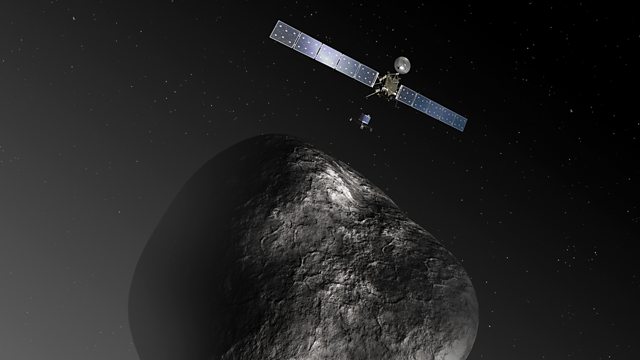Rosetta Landing Preparations
Rosetta gets set to send its probe on its way towards Comet Churyumov-Gerasimenko in an attempt to land on its surface.
The European Space Agency’s Rosetta mission is preparing for one of its most defining (and nerve-racking) moments - the release of its probe, Philae, onto Comet Churyumov-Gerasimenko’s surface. But Philae’s final destination, ‘Agilkia’, is a treacherous target. Paolo Ferri, Head of Mission Operations at the European Space Agency, talks about the hopes and fears ahead of Rosetta’s big moment.
Hepatitis-C vaccine
Hepatitis-C is a massive worldwide problem. While effective anti-viral treatments do exist, they are expensive and administering them effectively is not always feasible, especially in developing countries where the virus is prevalent. However, the results of a new Hepatitis-C vaccine show great promise. Professor Ellie Barnes from the University of Oxford was part of the research team and explains how this new potential vaccine works.
The Red-Dead Canal
For years, Israel, Syria and Jordan have diverted more than 90% of the River Jordan’s southward flow to agricultural and industrial processes, choking the Dead Sea, the lowest point on earth, and adversely affecting its ecosystems. There are plans to build a 180km-long canal that would carry water from the Red Sea to revive the Dead Sea. Dr Moneef Zoub, Director General of the Islamic Academy of Sciences, and Dr Zafar Adeel, Director at the UN University for Water, Environment and Health, discuss what this ambitious project could achieve.
Making Use of Dirty Water
In Tanzania, another project to provide clean water is underway, which could hopefully solve a major environmental issue for many people living in East Africa. Here, only one out of 10 existing industries treat their waste-waters to any degree. Now, Bio Innovate Africa - a programme managed by the International Livestock Research Institute - is working to reduce the impact of industry on freshwater supplies. Sophie Mbuguah reports for Science in Action.
Early High Altitude Humans
Cold temperatures, high solar radiation and low oxygen levels are far from friendly conditions at high altitude. Survival in such extreme environments is tough but archaeologists have recently found evidence suggesting that human life up high existed some 12,000 years ago, a millennium early that previously documented. Dr Kurt Rademaker, from the University of Tubingen, talks about what they unearthed over 4500 metres above sea level in the Peruvian Andes.
Presenter: Jack Stewart
Producer: Ania Lichtarowicz
(Image: Rosetta and Philae at Comet, Credit: European Space Agency)
Last on
More episodes
Previous
Chapters
-
Rosetta prepares for landing
Rosetta gets ready to attempt the first ever comet-landing.
Duration: 03:07
Hepatitis-C vaccine
Initial trials show promising signs for a new Hepatitis-C vaccine.
Duration: 05:01
The Red-Dead Canal
Plans to revive the vanishing Dead Sea.
Duration: 06:40
Making use of dirty water
Generating energy from wastewater in East Africa.
Duration: 05:45
Early high altitude humans
Oldest evidence for human life at high altitudes is unearthed.
Duration: 06:35
Broadcasts
- Thu 6 Nov 2014 19:32GMTÂ鶹ԼÅÄ World Service Online
- Fri 7 Nov 2014 00:32GMTÂ鶹ԼÅÄ World Service Online
- Fri 7 Nov 2014 04:32GMTÂ鶹ԼÅÄ World Service Online
- Fri 7 Nov 2014 13:32GMTÂ鶹ԼÅÄ World Service Online
Podcast
-
![]()
Science In Action
The Â鶹ԼÅÄ brings you all the week's science news.


